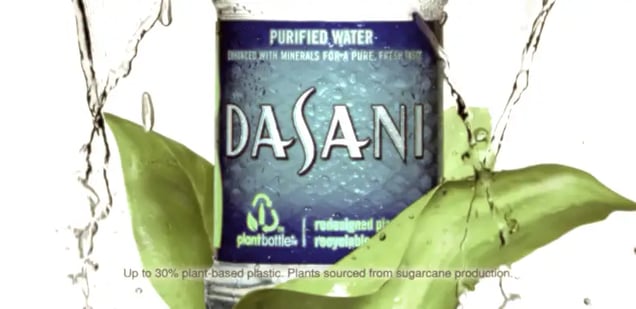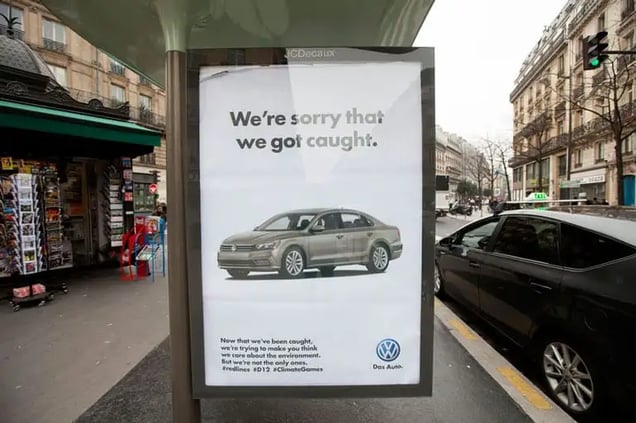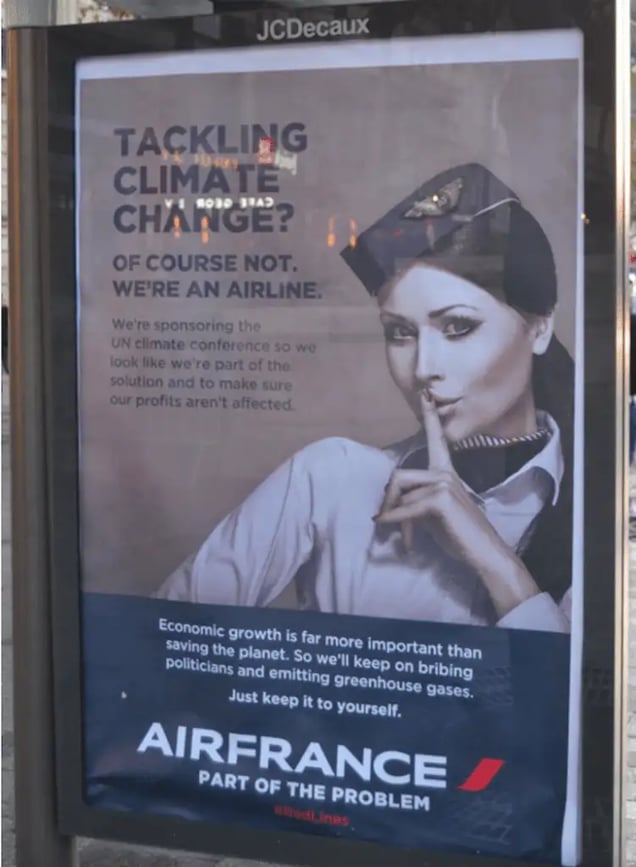Global brands like to pretend they’re eco-friendly. The key word here is “pretend.” In Paris, at The United Nations Climate Change Conference, big brands were being called out last week for their attempts to “greenwash,” themselves.

Six hundred fake advertising posters were placed all over Paris by UK activist group Brandalism. They’re smart and sarcastic and mock many of the brands that are sponsoring the conference, including Air France and Exxon. Brandalism is calling out companies who get away with polluting the environment, putting profits ahead of the planet.
A survey of 10 of the climate conference sponsors found that most don’t publish data about their carbon emissions. And some of these companies are heavily invested in fossil fuels – which contribute to global warming. Only one company surveyed was reducing its emissions in line with the EU’s target goals of cutting greenhouse gases by 80% by 2050.
“By sponsoring the climate talks, major polluters such as Air France and GDF-Suez-Engie can promote themselves as part of the solution – when actually they are part of the problem,” said Joe Elan from Brandalism in a press statement.
We take a look at some of the biggest climate change offenders to see what’s really going down.

Coca-Cola’s shameful story
Coca-Cola was one of the Climate Change Conference sponsors. In their profile on the conference’s website, the company claims it has “an enduring commitment to building sustainable communities … (and is) focused on programs that reduce its environmental footprint.”
But Coca-Cola is not actually environmentally friendly. There are multiple examples.
For one, Coke’s been accused of taking water away from farmland in drought-ridden areas of India and Latin America. Farmers in some of those places were eking by with just enough water to sustain their crops and feed the local population. But when Coke opened bottling plants, it sucked water away from those farmers and crippled their ability to grow or feed themselves.
In 2006, a campaign group called War On Want reported that Northern Indian farmers couldn’t irrigate crops after a Coke bottling plant opened.
Two years before that, a Coke plant in Kerala, India was forced to close after it allegedly contaminated local water.
And coke isn’t just a soda company. It also owns the bottled water company Dasani.
A local newspaper in the California desert reported earlier this year that Dasani and other bottled water companies like Crystal Geyser, Arrowhead, and Aquafina were tapping aquifers and bottling stream water in some of the most drought-ridden parts of the state. This took place during one of the worst dry spells in recent California history. Some companies were even taking the water from national forests.
Dasani purchased municipal water from Downey, San Leandro, and Anaheim. Residents were outraged and said local governments shouldn’t sell a public resource as a commodity.
To its credit, Dasani did recently start making bottles that can be twisted down to half their original size for easier recycling.

Volkswagen: Scandal central
Volkswagen didn’t appear to be a conference sponsor but it was featured in some of the faux ads in Paris.
The company has been floundering this month in the wake of the Dieselgate scandal. It was revealed that the automaker installed technology to fake its way through emissions tests; its cars actually emitted up to 40 times more than the permitted levels of smog.
In case you missed it, VW admitted last month that 11 million of its cars were equipped with this software. The software recognized when the car was being tested and activated technology that reduced emissions — but only during the test. During the rest of the time, the car polluted more, possibly in order to save fuel.
Volkswagen got caught after the California Air Resources Board launched an investigation.
The Jetta (2009-2015), Beetle (2012-2015), Passat (2012-2015), A3 (2010-2015), Jetta SportWagen (2009-2014), Golf (2010-2015), and Golf SportWagen (2015) all had the emissions cheating technology.
This reveal lead to Volkswagen’s U.S. sales plummeting 25% in November, despite heavy discounts and the fact that November is a great month for car sales, USA Today reported.

Air France: smoking up the sky
Air France is another sponsor of the climate conference, despite the fact that airlines are known culprits when it comes to air pollution.
Pollution from plane exhaust kills more people than plane crashes, National Geographic magazine reported.
Crashes kill no more than a thousand people every few years. But emissions from planes flying above 3,000 feet kill about 10,000 people every year, according to a study by the Massachusetts Institute of Technology.
The researchers used a computer model of flight paths, fuel consumed, and estimated emissions, which include sulfur dioxide and nitrogen oxide.The computer tracked where people were breathing the pollutants.
From the data, researchers estimated that about 8,000 annual deaths are caused by the pollution of high flying planes and 2,000 from planes landing and taking off. The most common causes of death were cardiovascular and respiratory diseases such as lung cancer.
Airplane smog also contributes to global warming. Right now, it’s only accountable for 2% of global emissions, but it’s one of the fastest growing sources of greenhouse gases, the New York Times reported in June. Global airline emissions could be 70% higher in 2020 than they were in 2005, according to a report by the European Commission. For that reason, the Obama administration vowed in June to begin regulating emissions from airplanes.

BP and its upsetting use of euphemisms
BP is not a sponsor of the Paris conference (Exxon is). But as an American, I have to throw them in here as an example of a company that wasn’t the subject of one of the fake ads, but easily could have been because of their efforts at “greenwashing.” Every time I see a BP commercial I get pissed off all over again.
Watch this 2012 ad:
“Two years ago the people of BP made a commitment to the gulf, and every day since we’ve worked hard to keep it.”
Really? I’m sorry, but what it should say is, “Two years ago, the people of BP neglected safety standards and years of warnings because they were too busy sucking oil out of the ocean floor, made a catastrophic error, and subsequently pumped the ocean full of oil that had been safely buried in the earth’s crust, killing the marine life AND almost a dozen people AND eliminating thousands of jobs.”
As you may recall, the Deepwater Horizon Oil rig broke on April 20, 2010, and began spewing 4.9 million barrels of oil into the ocean. The leak went unfixed and continued gushing for an unbelievable 87 days, causing the largest accidental oil spill in the history of the oil industry.
So why did the Climate Change Conference consult with these offenders?
When confronted about the hypocrisy of some of these companies, it makes me wonder whether it’s worth having them at the table during climate talks at all.
Global brands need to do more than just PR stunts and fake-it-until-they-get-caught like VW did. Sure, they saw their profits plummet when disgusted customers caught on to their lies, but that’s working backwards; we want to move forward together for a greener planet.
Hopefully some of the more searing ads posted around Paris will get these companies’ attention, and help them commit to true change.
Climate